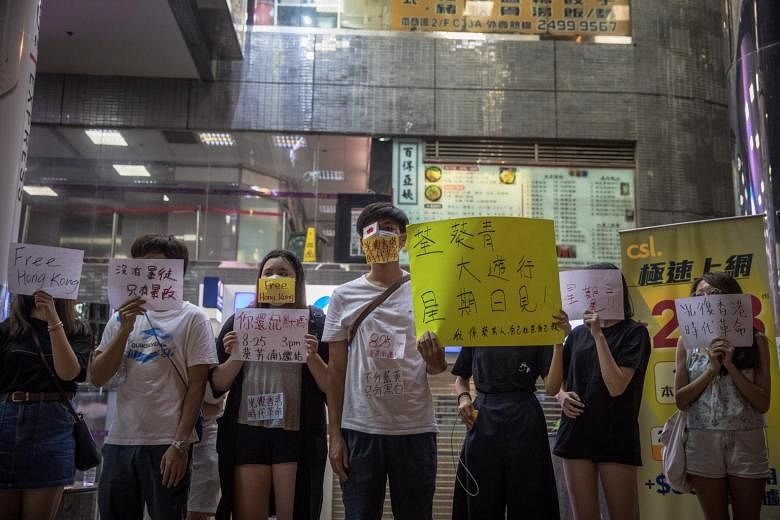HONG KONG (BLOOMBERG) - For all the tumult Hong Kong has seen since pro-democracy protests erupted in early June, the countdown to a crucial anniversary for China on Oct 1 makes the next six weeks particularly sensitive.
The 70th anniversary of the People's Republic of China, the name used by Communist Party leaders after they forced Chiang Kai-shek's regime to retreat to Taiwan, will feature a military parade through Beijing personally inspected by President Xi Jinping. That has raised some fears that Mr Xi will seek to get Hong Kong under control by then to avoid any violence that steals headlines.
Much may depend on what happens in the first week of September, when students who have been driving the demonstrations are set to return to universities and high schools.
While some analysts see the start of the school year sapping support for the protests, student groups are planning strikes to keep up momentum in the push against Beijing's increased control of Hong Kong.
"We have a lot of class strikes planned in September by both secondary school and university students," said Mr Sunny Cheung, a 23-year-old student and a member of the Hong Kong Institutions International Affairs Delegation, which represents 12 major schools including the University of Hong Kong. "We will have vast support."
'GOLDEN WINDOW'
The heightened stakes have added pressure on Hong Kong Chief Executive Carrie Lam to orchestrate a resolution without more violence or potential fatalities that could inflame tensions - and possibly prompt Mr Xi to mobilise the People's Liberation Army to maintain control.
The peaceful protest on Sunday followed weeks of clashes marked by volleys of tear gas and has provided an opening for both sides to seek common ground.
"The next 10 days is a golden window," Mr Michael Tien, a pro-establishment lawmaker and businessman, told Bloomberg Television on Tuesday (Aug 20).
If Hong Kong "wants to avoid any central government intervention during the month of September, this is a perfect time for Carrie Lam to think about addressing some of the five demands".
While China has turned up the pressure on businesses and government officials to try and subdue the protests, sending in forces to quell an uprising is still seen as a last resort.
Part of Beijing's strategy is focusing on the economic damage to Hong Kong in a bid to undermine support for the students, according to Mr Willy Lam, adjunct professor at the Centre for China Studies at the Chinese University of Hong Kong.
"At least before the National Day, China will not resort to armed force to defuse the Hong Kong protests," Mr Lam said. "Any movement of that kind will only cast a shadow on the anniversary itself."
OLIVE BRANCH
The protesters have said they won't leave the streets until Mrs Lam completely withdraws a Bill allowing extraditions to China, opens an independent inquiry into police violence, releases those arrested, stops calling protesters "rioters" and allows citizens to pick their leaders. Beijing has so far refused to yield and has backed the police to punish protesters who break the law.
Mrs Lam on Tuesday offered a bit of an olive branch to protesters, offering to establish a platform for dialogue, investigate complaints against police and institute a wide-ranging fact-finding study into the root causes of the conflict.
While the move falls short of protester demands, and was quickly rejected by the main group leading the demonstrations, it showed a willingness to at least consider steps that go halfway.
Protesters are planning several more actions over the next few weeks that will show whether they can build upon Sunday's peaceful rally. Demonstrators are divided between moderates and more extreme groups that have brandished iron poles and thrown Molotov cocktails at police officers who have in turn used tear gas, batons and bean-bag rounds.
'RARE MOMENT'
Opposition lawmaker Fernando Cheung, who has often been at the scene of flash-points trying to defuse tensions, said the government would be wrong to think the protests would subside in September when students go back to school.
Still, he saw the relative pause in hostilities as a key chance to come up with a solution before things get worse.
"This is a rare moment that the more militant side of the protesters have agreed to exercise restraint," Mr Cheung said. "But if there is no response - or if this is the response - it basically means there is no end to this. And the chaotic situation will continue. There could be more escalation, and it won't be pretty."










